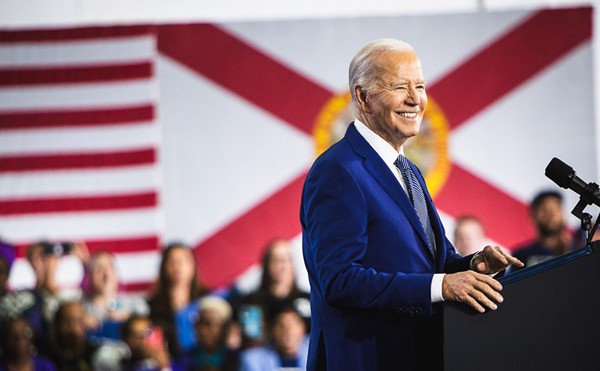NRA seeks to overturn Florida law prohibiting rifle sales to adults under 21
Federal law already barred sales of handguns to people under 21.
By Dara Kam and News Service of Florida on Fri, May 20, 2022 at 12:05 pm
Pointing to a ruling in a California case, lawyers for the National Rifle Association this week urged a federal appellate court to strike down a Florida law prohibiting sales of rifles and other long guns to adults under age 21.
A three-judge panel of the Atlanta-based 11th U.S. Circuit Court of Appeals in March heard arguments in the Florida lawsuit, which the NRA filed after the Legislature passed the law in 2018 in response to the mass shooting at Marjory Stoneman Douglas High School in Parkland.
The ban on long-gun sales to people ages 18 through 20 was included in a sweeping school-safety law. Federal law already barred sales of handguns to people under 21.
The NRA’s lawsuit argued, in part, that the state age restriction infringes on Second Amendment rights of young adults, who are authorized to use weapons when they serve in the military or in law enforcement.
Chief U.S. District Judge Mark Walker upheld the law in June, saying that he was following precedent in previous court decisions. Walker, however, also described the case as falling “squarely in the middle of a constitutional no man’s land.” It remains unclear when the 11th Circuit will rule on the NRA’s appeal of Walker’s decision.
But in a 2-1 ruling last week, the 9th U.S. Circuit Court of Appeals decided that a California law banning sales of semiautomatic centerfire rifles to people under age 21 was unconstitutional. A semiautomatic rifle fires a single bullet each time a trigger is pulled and does not require a user to reload between shots. Most rifles use centerfire ammunition.
“America would not exist without the heroism of the young adults who fought and died in our revolutionary army. Today we reaffirm our Constitution still protects the right that enabled that sacrifice: the right of young adults to keep and bear arms,” Judge Ryan Nelson of the San Francisco-based court wrote in the May 11 ruling.
The decision in the California case, known as Jones v. Bonta, prompted the NRA on Monday to file what is known as a “supplementary authority” document in the Florida case.
“The Ninth Circuit has confirmed that the Second Amendment protects young adults’ right to purchase firearms,” NRA attorney John Parker Sweeney wrote.
The California law also requires hunting licenses for people under age 21 who are purchasing long guns such as rifles or shotguns, except for members of the military or law enforcement.
“California’s law is less restrictive than Florida’s, which bans all young adult firearm purchases,” Sweeney noted.
Key legal arguments in the Florida case hinged on a 2008 U.S. Supreme Court ruling in a case known as District of Columbia v. Heller. While the ruling is broadly considered a major victory for gun-rights supporters, it also said certain “longstanding prohibitions” about guns do not violate the Second Amendment and established that the constitutional right to keep and bear arms is “not unlimited.”
The Heller case pointed to prohibitions on such things as felons and mentally ill people possessing guns. In his June ruling, Walker concluded that restrictions on 18-to-20-year-old people buying guns were “analogous” to the restrictions cited in the Heller case.
But the 9th Circuit ruling found that “the historical record shows that the Second Amendment protects young adults’ right to keep and bear arms.”
The decision also “held that law-abiding, responsible young adults are categorically distinct from felons and the mentally ill and cannot be subjected to the same prohibitions,” Sweeney wrote.
But in a document filed Tuesday in the 11th Circuit, lawyers for Florida argued that the 9th Circuit ruling was out of line with previous court decisions.
The 9th Circuit panel “misread” the Supreme Court’s Heller decision, Christopher J. Baum, Florida senior deputy solicitor general, wrote.
Baum noted that the Supreme Court acknowledged in the Heller ruling that its list of allowable prohibitions on such things as felons and mentally ill people possessing guns did “not purport to be exhaustive.”
“That is why so many courts have upheld restrictions not on that list as longstanding,” Baum argued. “By treating the ‘enumerated categories’ in Heller as exclusive, the panel’s ruling (in the California case) is contrary to other decisions from the Ninth Circuit itself.”
Baum also argued that the panel “discounted most of the relevant Reconstruction era law” by saying that historic prohibitions only banned the sale of handguns.
“Laws from that period restricting access to ‘the quintessential self-defense weapon,’ … however, show that laws restricting those under 21 from purchasing firearms for self-defense are longstanding and thus permissible,” Baum wrote.
A three-judge panel of the Atlanta-based 11th U.S. Circuit Court of Appeals in March heard arguments in the Florida lawsuit, which the NRA filed after the Legislature passed the law in 2018 in response to the mass shooting at Marjory Stoneman Douglas High School in Parkland.
The ban on long-gun sales to people ages 18 through 20 was included in a sweeping school-safety law. Federal law already barred sales of handguns to people under 21.
The NRA’s lawsuit argued, in part, that the state age restriction infringes on Second Amendment rights of young adults, who are authorized to use weapons when they serve in the military or in law enforcement.
Chief U.S. District Judge Mark Walker upheld the law in June, saying that he was following precedent in previous court decisions. Walker, however, also described the case as falling “squarely in the middle of a constitutional no man’s land.” It remains unclear when the 11th Circuit will rule on the NRA’s appeal of Walker’s decision.
But in a 2-1 ruling last week, the 9th U.S. Circuit Court of Appeals decided that a California law banning sales of semiautomatic centerfire rifles to people under age 21 was unconstitutional. A semiautomatic rifle fires a single bullet each time a trigger is pulled and does not require a user to reload between shots. Most rifles use centerfire ammunition.
“America would not exist without the heroism of the young adults who fought and died in our revolutionary army. Today we reaffirm our Constitution still protects the right that enabled that sacrifice: the right of young adults to keep and bear arms,” Judge Ryan Nelson of the San Francisco-based court wrote in the May 11 ruling.
The decision in the California case, known as Jones v. Bonta, prompted the NRA on Monday to file what is known as a “supplementary authority” document in the Florida case.
“The Ninth Circuit has confirmed that the Second Amendment protects young adults’ right to purchase firearms,” NRA attorney John Parker Sweeney wrote.
The California law also requires hunting licenses for people under age 21 who are purchasing long guns such as rifles or shotguns, except for members of the military or law enforcement.
“California’s law is less restrictive than Florida’s, which bans all young adult firearm purchases,” Sweeney noted.
Key legal arguments in the Florida case hinged on a 2008 U.S. Supreme Court ruling in a case known as District of Columbia v. Heller. While the ruling is broadly considered a major victory for gun-rights supporters, it also said certain “longstanding prohibitions” about guns do not violate the Second Amendment and established that the constitutional right to keep and bear arms is “not unlimited.”
The Heller case pointed to prohibitions on such things as felons and mentally ill people possessing guns. In his June ruling, Walker concluded that restrictions on 18-to-20-year-old people buying guns were “analogous” to the restrictions cited in the Heller case.
But the 9th Circuit ruling found that “the historical record shows that the Second Amendment protects young adults’ right to keep and bear arms.”
The decision also “held that law-abiding, responsible young adults are categorically distinct from felons and the mentally ill and cannot be subjected to the same prohibitions,” Sweeney wrote.
But in a document filed Tuesday in the 11th Circuit, lawyers for Florida argued that the 9th Circuit ruling was out of line with previous court decisions.
The 9th Circuit panel “misread” the Supreme Court’s Heller decision, Christopher J. Baum, Florida senior deputy solicitor general, wrote.
Baum noted that the Supreme Court acknowledged in the Heller ruling that its list of allowable prohibitions on such things as felons and mentally ill people possessing guns did “not purport to be exhaustive.”
“That is why so many courts have upheld restrictions not on that list as longstanding,” Baum argued. “By treating the ‘enumerated categories’ in Heller as exclusive, the panel’s ruling (in the California case) is contrary to other decisions from the Ninth Circuit itself.”
Baum also argued that the panel “discounted most of the relevant Reconstruction era law” by saying that historic prohibitions only banned the sale of handguns.
“Laws from that period restricting access to ‘the quintessential self-defense weapon,’ … however, show that laws restricting those under 21 from purchasing firearms for self-defense are longstanding and thus permissible,” Baum wrote.
Tags:

WE LOVE OUR READERS!
Since 1988, CL Tampa Bay has served as the free, independent voice of Tampa Bay, and we want to keep it that way.
Becoming a CL Tampa Bay Supporter for as little as $5 a month allows us to continue offering readers access to our coverage of local news, food, nightlife, events, and culture with no paywalls.
Scroll to read more Florida News articles
Newsletters
Join Creative Loafing Tampa Bay Newsletters
Subscribe now to get the latest news delivered right to your inbox.















